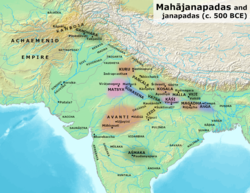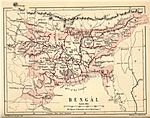Anga
Aṅga | |
|---|---|
| Unknown (~1100 BCE)–c. 530 BCE | |
 Aṅga and other kingdoms of the late Vedic period | |
 | |
| Capital | Champapuri (near modern Bhagalpur) and Malini (near modern Munger), Bihar |
| Religion | Historical Vedic religion Buddhism Jainism |
| Government | Monarchy |
• | Brahmadatta |
| Raja (King) | |
| Historical era | Iron Age |
• Established | Unknown (~1100 BCE) |
• Disestablished | c. 530 BCE |
| History of Bengal |
|---|
 |
Anga [a] was an ancient Indo-Aryan tribe of eastern India whose existence is attested during the Iron Age. The members of the Aṅga tribe were called the Āṅgeyas.[1]
Counted among the "sixteen great nations" in
Location
Aṅga proper was located between the Champā river to the west and the Rajmahal hills to the east. However, at times, its territories did extend to the sea in the south, or included Magadha in the west.[1]
The capital of Aṅga, named Campā, was located at the confluence of the Campā and Gaṅgā rivers, and corresponds to the modern-day villages of Campāpurī and Champanagar in the eastern part of the Indian state of Bihār. According to the Jātakas, Campā was also called Kāla-Campā, while Puranic texts claim its ancient name was Mālinī.[1]
The other important cities within the Aṅga kingdom included Assapura (Sanskrit: Aśvapura) and Bhaddiya (Sanskrit: Bhadrika).[1]
Etymology
According to the
The Ramayana (1.23.14) narrates the origin of name Aṅga as the place where Kamadeva was burnt to death by Siva and where his body parts (aṅgas) are scattered.[4]
History
Kingdom
Aṅga was first mentioned in the Atharvaveda, where it was connected to the Gāndhārīs, Mūjavats, and Māgadhīs. The founder of Aṅga might have been the king Aṅga Vairocana, who is mentioned in the Aitareya Brāhmaṇa as a ruler who had been consecrated by the Aryan ritual of Aindra mahābhiśeka.[1]
Vedic literature such as the Baudhāyana Dharmasūtra nevertheless listed the Āṅgeyas with peoples described as being of "mixed origin."[1]
Aṅga was a powerful kingdom at the time of the Aitareya Brāhmaṇa, which mentions the "world conquest" of one of the Āṅgeya kings. The Āṅgeya capital of Campā itself was counted until the time of the Buddha's death among the six most prominent cities of northern India, along with Rājagaha, Sāvatthī, Sāketa, Kosāmbī, and Vārāṇasī.[1]
During the Iron Age, Aṅga expanded to include Vaṅga within its borders, with the capital city of Campā being a wealthy commercial centre from where traders sailed to Suvarṇabhūmi. According to the Kathā-sarit-sāgara, the Āṅgeya city of Viṭaṅkapura was located on the shores of the sea.[1]
During the 6th century BCE, the king of Aṅga was Dadhivāhana,
Under Dadhivāhana's rule, Aṅga had conquered its western neighbour, the state of
During Udayana's captivity, the state of
Aṅga's prosperity ended when, in the middle of the 6th century BCE, the Māgadhī crown prince
Later history
During his pilgrimage there in the end of the 4th century, the Chinese monk Faxian noted the numerous Buddhist temples that still existed in Campā, transliterated Chanpo in Chinese (瞻波 pinyin: Zhānbō; Wade–Giles: Chanpo)[N.B. 1]. The kingdom of Aṅga by then had long ceased to exist; it had been known as Yāngjiā (鴦伽) in Chinese.[N.B. 2]
Varman rule on Anga
In the 11th–12th century, Anga region was under the control of Varman dynasty. Belava copperplate of Bhojavarman mentions that Jatavarman under the leadership of his father Vajravarman conquered Anga and established the rule of his family.[12]
See also
Notes
- IAST: Aṅga
- ^ a b c d e f g h i j k l m Raychaudhuri 1953, p. 106-110.
- ISBN 9788120820852.
- Suhma founded Suhma Kingdom in the western part of southern West Bengal.
- ^ "Bala Kanda Book I, Chapter 23". Archived from the original on 3 November 2022.
- ISBN 978-9-333-68377-7.
- ISBN 978-8-120-80805-8.
- JSTOR 596129.
- ^ Raychaudhuri 1953, p. 203.
- JSTOR 42930814.
- ^ Raychaudhuri 1953, p. 117.
- ^ a b 佛光電子大辭典 (Buddha's Light Electronic Dictionary). Taiwan: Buddha's Light Publishing (Fo Guang Shan)
- ISBN 978-81-7007-121-1.
References
- ISBN 9788173042850.
- ISBN 9788120618237.
- Raychaudhuri, Hemchandra (1953). Political History of Ancient India: From the Accession of Parikshit to the Extinction of Gupta Dynasty. University of Calcutta.
- ISBN 9788131716779.
